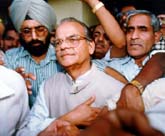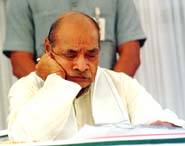Commentary / Vir Sanghvi
The middle class wants to see politicians in jail and doesn't
care whether they've been convicted of a crime or not
 Forgive me for being the pooper
who spoils the party but I cannot share in the middle class
delight at the spectacle of Indian's politicians being packed
off to jail without trial. Of course, I accept that corruption has
reached staggering levels, that many of those who are jailed
may well be crooks and that the law should be applied to all equally.
Forgive me for being the pooper
who spoils the party but I cannot share in the middle class
delight at the spectacle of Indian's politicians being packed
off to jail without trial. Of course, I accept that corruption has
reached staggering levels, that many of those who are jailed
may well be crooks and that the law should be applied to all equally.
But my reservations have nothing to do with the individuals involved;
I'm more concerned about the principle. Ultimately, the Narasimha
Raos, Kalpnath Rais, et al will be forgotten but the precededents
that strike me as being dangerous.
It is tempting to draw a parallel beteween the rationalisation
offered for encounter deaths and the explanations offered for
the denial of bail to prominent persons in cases where bail would
normally have been granted.
An encounter death - in which a police officer cold-bloodedly
murders a suspected terrorist or a criminal - goes against every
principle of natural justice and against the provisions of the
Constitution. Yet, it is a widely-accepted practice in areas where
there is a terrorist problem - Punjab for instance - or a crime
wave - as in Bombay.
Most middle-class people agree with the police view that it is
better to shoot a terrorist or a criminal dead than to go through
the hassle of dragging him through the courts.. To secure a conviction,
the police would have to provide evidence that it is not always
available and even if they did so, the case would take five years
to try.
Nobody seriously disputes that K P S Gill's police force killed
hundreds of terrorists in Punjab in such encounters. Equally,
it is widely accepted that the Bombay police prefer to shoot gangsters
than to arrest them.
Despite protests from human rights organisations, the great Indian
middle class remains broadly supportive of these killings. (When
opinions are sharply divided over Gill's behaviour, it is eve-teasing
that is on the agenda, not murder). It admits that the practice
is not exactly desirable but argues that the state of the courts
is such that the police have no alternative. There is simply no
other way.
Consider now, the justifications offered for the glee with which
the jailing of assorted politicians has been greeted.
Most of us know that bail is not a privilege granted by generous
judges to those accused of crime. It is the right of every citizen.
If you are not convicted of a crime, you are innocent and do not
deserve to go to jail. Period.
If however, the judge feels that there is a possibility of flight
or a danger that the accused might tamper with the evidence, then
he may refuse bail. If none of these condidtions exist then it
is almost unprecedented for a judge to refuse bail particularly
in a case of white-collar crime.
Given all of this, it is hard to see how most of the charge-sheeted
politicians can be refused bail. It is unlikely that Narasimha
Rao or L K Advani could hoodwink an immigration officer and slip
out of the country undetected. Moreover, in many cases, the offence
hass occurred over five years ago and there is no evidence let
for the accused to tamper with.
 What, for instance, could L K Advani have done if he was refused
bail? Broken into CBI headquarters and burnt the Jain diary? What
could Narasimha Rao do? Hold a knife to Lakhubhai Pathak's throat
and force him to retract his statment? He's had eight years to
threaten Lakhubhai and several months have clapsed since the pickle
king arrived in India and was within Rao's grasp.
What, for instance, could L K Advani have done if he was refused
bail? Broken into CBI headquarters and burnt the Jain diary? What
could Narasimha Rao do? Hold a knife to Lakhubhai Pathak's throat
and force him to retract his statment? He's had eight years to
threaten Lakhubhai and several months have clapsed since the pickle
king arrived in India and was within Rao's grasp.
Nevertheless, the middle class still hopes that they will all
be denied bail. It wants to see politicians in jail and it doesn't
care whether they've been convicted of a crime or not.
|





 Forgive me for being the pooper
who spoils the party but I cannot share in the middle class
delight at the spectacle of Indian's politicians being packed
off to jail without trial. Of course, I accept that corruption has
reached staggering levels, that many of those who are jailed
may well be crooks and that the law should be applied to all equally.
Forgive me for being the pooper
who spoils the party but I cannot share in the middle class
delight at the spectacle of Indian's politicians being packed
off to jail without trial. Of course, I accept that corruption has
reached staggering levels, that many of those who are jailed
may well be crooks and that the law should be applied to all equally.
 What, for instance, could L K Advani have done if he was refused
bail? Broken into CBI headquarters and burnt the Jain diary? What
could Narasimha Rao do? Hold a knife to Lakhubhai Pathak's throat
and force him to retract his statment? He's had eight years to
threaten Lakhubhai and several months have clapsed since the pickle
king arrived in India and was within Rao's grasp.
What, for instance, could L K Advani have done if he was refused
bail? Broken into CBI headquarters and burnt the Jain diary? What
could Narasimha Rao do? Hold a knife to Lakhubhai Pathak's throat
and force him to retract his statment? He's had eight years to
threaten Lakhubhai and several months have clapsed since the pickle
king arrived in India and was within Rao's grasp.